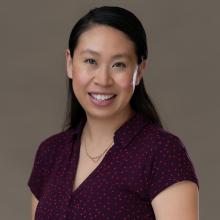Bonnie Leung
Why did you decide to pursue a graduate degree?
As a nurse, I often encountered situations that left me questioning "why is this happening?" and "what can we do to improve upon or change this?" After participating in a research challenge dedicated to support health professionals who want to engage in research activities at my workplace, I realized research can be used as a tool to answer my questions. I decided to pursue a graduate degree to acquire the necessary skills to critically examine my experiences and observations and create solutions to improve the health and health care outcomes of the people I provide care for and support.
Why did you decide to study at UBC?
The UBC School of Nursing is Canada's top-ranked nursing program and is internationally renowned for their contributions to nursing and health research, nursing philosophy and health system leadership.
What is it specifically, that your program offers, that attracted you?
In addition to the support services and resources for students, the School of Nursing has many renowned nursing scholars and thought leaders who have influenced my practice and world view. I have the greatest privilege of having Drs. Sally Thorne and Kristen Haase as co-supervisors, who are experts in my field and in qualitative methodology. They have been instrumental with my learning and shaping my program of research.
What was the best surprise about UBC or life in Vancouver?
I commute by bicycle so I am very happy to see that Vancouver is becoming more bike friendly with increasing ways to safely get around the city.
What aspect of your graduate program do you enjoy the most or are looking forward to with the greatest curiosity?
The colleagues I have had the privilege to meet in and beyond my PhD cohort have been invaluable. There is something to be said about finding people who share the same passion and world views as you. My colleagues have been very inspirational and I have learned a lot from them. I cannot wait to share our successes with one and another and find opportunities to collaborate on in the future.
What do you see as your biggest challenge(s) in your future career?
My goal is to become a clinician scientist after completing my PhD. This means I want to maintain my clinical role as nurse practitioner while developing and maintaining my program of research. Currently, the role of nurse clinician scientists is still not well recognized within all levels of the local health care system.
There are faculty members within the School of Nursing who have successfully created opportunities and effectively demonstrated the value of nurse clinician scientists within the local healthcare organizations, so I will draw on their expertise as I move forward with my program and prepare for my future career endeavours.
What aspects of your life or career before now have best prepared you for your UBC graduate program?
Being a nurse and a mother of young children have prepared me with the ability to multitask, prioritize and manage time wisely. These roles have also taught me to be flexible and adaptable to unpredictable changes, and to focus on what's important.
What do you like to do for fun or relaxation?
The Greater Vancouver area has some of the most scenic places to cycle. I enjoy getting up early on a weekend morning and cycle with my group of friends, making sure to stop for some tasty pastries and coffee along the way.
What advice do you have for new graduate students?
Something I am still learning to do is how and when to say "no". As a graduate student, there are many learning and experiential opportunities. While the training program is finite, learning does not stop when you graduate and opportunities you may have missed out on may come up again, so it is ok to focus on your work and maintaining a healthy work-life balance.
Learn more about Bonnie's research
With globalization and international migration, Canada is witnessing a rapidly diversifying ageing population. By 2041, the proportion of racialized older adults (ROA) aged 65 years or older is projected to double to 26.2%. Cancer disproportionately affects older adults and a significant proportion of people affected by cancer in the future will be those from diverse cultural, ethnic and linguistic backgrounds. Effective patient-centred communication and engagement with patients with shared decision-making (SDM) are associated with improved treatment adherence, survival, and health-related quality of life. For older adults, SDM and communication can be hindered by multiple barriers, such as hearing and cognitive impairment. For older immigrants, SDM can be further challenged by language and cultural barriers. While there is growing interest in the study of older adults with cancer, racialized older immigrants remain underrepresented in clinical studies. Improving SDM with this population may increase their participation in clinical studies and reduce knowledge and care gaps. For my doctoral thesis, I will work with people with lived experiences and key knowledge users to identify factors, processes, and contexts facilitating or hindering SDM between racialized older immigrants with cancer and their caregivers, and cancer care clinicians. I will examine how the intersections of age, race, and immigration status; timing of life events; and structural forces influence decision-making. The outcome of my research is to co-develop tools and resources with patient and community partners to overcome barriers to SDM in the context of cancer care.

